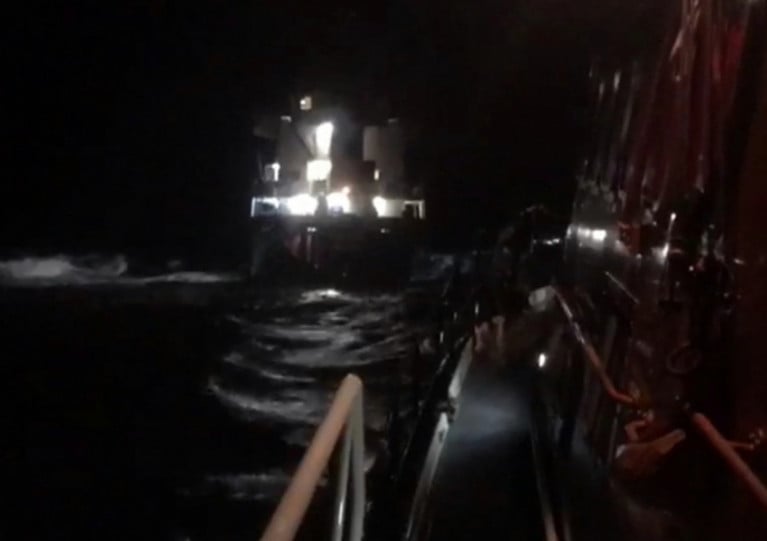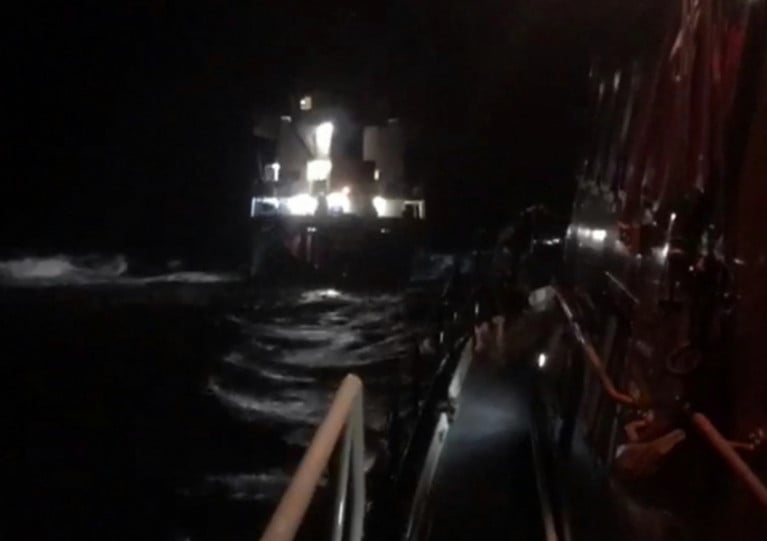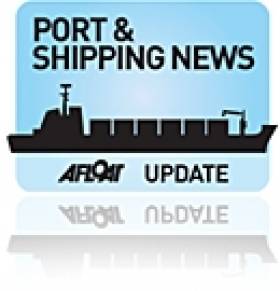Displaying items by tag: Isle of Skye
Exclusion Zone Set Up At Cargo Ship Out Of Drogheda That Ran Aground In Western Scotland
An exclusion zone was set up around a cargo ship out of Drogheda that ran aground in Scotland’s Hebrides earlier this week, as it was battered by persisting storm conditions.
As previously reported on Afloat.ie, eight crew were airlifted from the MV Kaami on Monday (23 March) after it grounded on a reef known locally as Eugenie Rock, some six nautical miles off the Isle of Skye.
The MV Kaami had left Drogheda Port less than two days previously, en route for Slite in Sweden, with a cargo of refuse-derives fuel (RDF) in pellet form.
The Press and Journal reports that a salvage team arrived on Tuesday (24 March) to inspect the abandoned vessel, while the tug Ievoli Black remained at the scene on guard.
Eight Crew Airlifted From Cargo Ship Aground Off Skye
Eight crew were rescued from a cargo ship out of Drogheda that ran aground off the Isle of Skye in Scotland’s Inner Hebrides early yesterday morning (Monday 23 March).
The MV Kaami had left Drogheda Port on the evening of Saturday 21 March and was due to arrive in Slite, Sweden this weekend.
But the 90m cargo vessel ran aground in The Minch at what’s known locally as Eugenie Rock, about six nautical miles north-west of Duntulm on Skye.
Portree RNLI’s lifeboat was launched at 2.24am yesterday morning in response to a MayDay call from the MV Kaami, as did the Emergency Towing Vessel Ievoli Black and the Pharos, a Northern Lighthouse Board buoy-laying vessel.
The duty Stornoway Coastguard rescue helicopter arrived on scene, where weather conditions has a Force 8 southerly wind with a rough sea state, and began to airlift eight of the Russian crew to Stornoway. No injuries were reported.
Drifting Irish-Cargo Vessel Rescued by ETV
The 1,285grt coaster owned by Coast Lines, was bound for Stornoway with a cargo of coal when the incident occurred. Onboard the vessel was 27 cubic metres of diesel oil and 400 litres of lube oil.
Despite the lack of engine-power, the vessel maintained electricity capacity but was unable to use anchor while drifting in 20m waters and over a rocky seabed. The vessel continued to drift in Force 7-8 conditions, close to the islands in Harris Bay. Fortunately the Mallaig lifeboat was able to get a line onboard the 1969 built Red Duchess to halt further drifting closer to the shore.
This brought some extra time for the stricken vessel until the UK Maritime & Coastguard Safety Agency (MCA) deployed their ETV (Emergency Towing Vessel) Anglian Prince (1980/1,641grt) to the scene.
In the interim period a coastguard rescue helicopter moved to Rhum to be on standby in the event of having to evacuate the crew. This was not required as the Anglian Prince managed to secure a line and safely tow the Red Duchess to Stornoway.
The Red Duchess is a veteren vessel in the coastal trade, regularly trading throughout Irish Sea ports and in particular for many years has been engaged in the carriage of timber logs between Scotland and Youghal, Co. Waterford.
As for the ETV Anglian Princess, she was involved only a fortnight ago in the high-profile rescue of the Royal Navy's HMS Astute, described as the newest, largest and stealthiest attack class submarine. The £1.2 billion submarine was believed to be undergoing sea trials when it went aground off the Isle of Skye. Anglian Princess successfully pulled free the submarine from a shingle bank.
Ironically hours before the the submarine's grounding, the Anglian Princess and three other ETV vessels were announced by the British Government to be withdrawn funding from the nation's (ETV) Emergency Towing Vessel service. The charter of the fleet of four ETV's from owners Klyne Tugs (Lowestoft) Ltd to the UK's Maritime & Coastguard Safety Agency (MCA) was expected to last with the current contract expiring in September 2011.
Since 2001, KTL's fleet of powerful tugs are on charter to the (MCA) for use in pollution control incidents and for towing vessels which are in difficulty in coastal waters.
The fleet are based in strategic locations around the UK, with two covering in Scottish waters, at Stornoway, the Western Isles and Lerwick in the Northern Isles (Shetland and Orkney). The other pair of ETV's cover the south of England at Falmouth in Cornwall and Dover in Kent. The Dover station is funded jointly with French maritime authorities.

































































